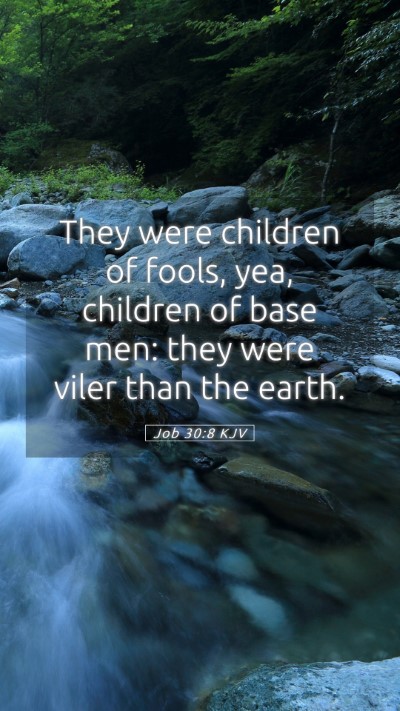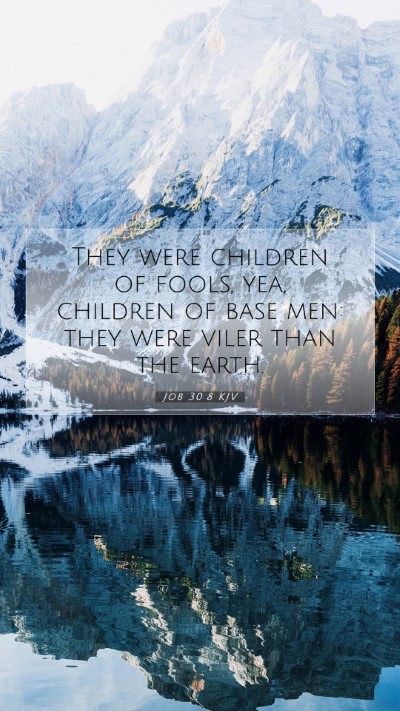Understanding Job 30:8
Job 30:8 states, "They were children of fools, yea, children of base men: they were viler than the earth." This verse comes from a section of the Book of Job where Job is lamenting his current state and contrasting it with his earlier life when he was esteemed and respected.
Bible Verse Meanings
In the context of this scripture, Job is expressing his deep suffering and degradation by referring to a group he views as having no worth: "children of fools." Matthew Henry suggests that Job is highlighting how his former status has eroded, leading him to reflect critically on those around him who now seem inferior in character.
Bible Verse Interpretations
- Loss of Reputation: Albert Barnes comments on the loss of reputation that Job has experienced. He was once surrounded by esteemed men, but now the "children of base men" mock him, emphasizing the dramatic reversal of fortune.
- Contrast with Past Glory: Adam Clarke notes that this verse illustrates Job’s grief as he remembers his past wisdom and how it contrasts sharply with his present state among those he deems unworthy.
Bible Verse Understanding
This verse reflects Job's emotional turmoil. His statement about the base men and fools serves to underline his feelings of alienation and the degradation of societal values around him. It also points to the theme of suffering and social inversion prevalent throughout the Book of Job.
Bible Verse Explanations
Job’s reference to the children of fools signifies not only those who lack wisdom but also those who might insult or take advantage of his suffering. By contrasting himself with these individuals, Job reinforces the notion that worldly wisdom and societal worth can shift dramatically.
Bible Verse Commentary
In examining this scripture, commentators often emphasize the painful irony of Job's situation. Job once held a place of honor, and the mockery from the lower echelons of society pains him deeply. This commentary focuses on the moral aspects of suffering and the idea that one's social status can be transient.
Scripture Analysis
This verse can be analyzed both thematically and contextually. Thematically, it speaks to the inversion of social order and the experience of humiliation in suffering. Contextually, it fits within Job's broader discourse on life's injustices.
Biblical Exegesis
Exegesis of Job 30:8 reveals deep theological insights about suffering and societal values. Job’s lament draws attention to the apparent chaos in divine justice—those who are foolish seem to rise while the wise suffer unjustly.
Bible Study Insights
For individuals engaged in Bible study groups, this verse presents rich material for discussion about the nature of wisdom, the struggles of faith in times of personal affliction, and the role that societal perceptions play in an individual's experience of suffering.
Meaning of Bible Verses
Understanding Job 30:8 involves recognizing its broader implications about human dignity, the relativity of wisdom, and the often harsh realities of life that juxtapose the righteous with the unrighteous.
Understanding Scripture
This scripture encourages readers to reflect on how societal status can be ephemeral and how faith and character are often tested in the crucible of suffering.
Cross References
- Proverbs 10:21 - "The lips of the righteous feed many: but fools die for want of wisdom."
- Job 12:5 - "He that is ready to slip with his feet is as a lamp despised in the thought of him that is at ease."
- Psalm 22:6 - "But I am a worm, and no man; a reproach of men, and despised of the people."


